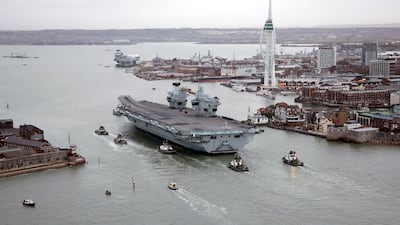Experts assembling at the UK House of Commons on Tuesday will be asked to give their views on the country's relationships with the South-East Asian nations.
Three sets of panels featuring strategic, development and economic experts have been arranged. The MPs on the foreign affairs committee will be able to draw witness perspectives on what is being billed as an opportunity to understand the region’s own priorities and how the UK can fit with its partners on the other side of the world.
Indonesia is at the heart of the special Parliamentary session, as the country raised its profile and global standing in 2022, having served as president of the Group of 20.
In a turbulent year, the G20's role gave Asia a chance to define its own international interests, faced with Russia’s war in Ukraine and the global inflation and energy crisis. European countries have had their own awakening in 2022 and their ambitions in the Indo-Pacific must now be weighed against a changed security landscape much closer to home.
When I spoke to Simon McDonald, the former head of the foreign office last week, he backed efforts to overhaul the UK’s Integrated Review that was published only last week and made a “tilt” to the Indo-Pacific its central goal.
“The Integrated Review is a good piece of work but to me it is too ambitious,” he told The National. “It feels quite beginning of the 20th century rather than middle of the 21st century. We’re taking on too many tasks for a country of our size. I believe we must prioritise. Logically that begins with focusing on our neighbourhood.”

Rory Medcalf, the well-connected head of the National Security College at the Australian National University, was in London last week and he picked up on the use of the word "tilt" by the British.
His view was that the word itself was not helpful. It did not provide a defined outreach, neither for that matter was it adequate overall for a country to occasionally deploy an aircraft carrier or scatter a few troops to Pacific powers. What he wanted was a full-spectrum engagement across development, education, technology and space as well as military.
“In Australia, there’s a view [that] we want the UK engagement to be realistic, and I would say that about others on this side of the world,” he told a meeting at the Royal United Services Institute last week. “The same applies to the French and EU engagement in the Indo-Pacific.”
The EU has set out its own Indo-Pacific strategy, which foreign affairs chief Josep Borrell earlier this month reiterated was a priority for the bloc. This has three pillars around solidifying engagement with states and interests through the region; to avoid the assertion of primacy in the area through Chinese power projection, and to buttress against any Washington versus Beijing zero-sum dynamic in the future.
As the largest security actor in the EU, France has its own pro-active ambitions in the mega-region. French President Emmanuel Macron was in Bangkok at the weekend for Pacific Rim meetings, where he vowed to “progressively multiply” the country’s initiatives, especially in core South-East Asia.
There is a universal message that the Europeans bring to the region, especially around the Ukraine war and freedom of navigation for maritime or other patrols through the ocean. Mr Macron insists that France is also doubling down on its 2018 Indo-Pacific strategy, working with the Indian and Japanese militaries, in particular, to achieve a joint footprint.
As Prof Medcalf observed, the essence of the Indo-Pacific is the importance of the maritime presence that then grows across dimensions. And as Mr McDonald noted, the importance of the Middle East has been steadily augmented by the growth of Pacific countries.
Making the European aspirations a reality is an evolving challenge. Leaders in the UK have an extraordinary Indo-Pacific background. Fluent in Japanese, Chancellor of the Exchequer Jeremy Hunt complements Prime Minister Rishi Sunak, who at the G20 spoke to Indian Prime Minister Narendra Modi about closer ties.
Mr Hunt made a point of using the budget statement last week to make more defence spending in the years ahead, contingent on a revamp of the Integrated Review. This task is being undertaken by John Bew, the UK prime minister’s foreign affairs adviser and author of the "tilt" concept.
It means the UK, like France, is going back to the drawing board on its overtures to the region. Europe, as a whole, has compelling security and resources interests to establish, but it should make only credible promises.
Fortunately, there is a strong base of mutual priorities, not least the multilateral rules that underpin world trade and economic ties. There’s a foundation of forums such as the Quad group of countries, Aukus and G7 that keeps the big countries engaged in a constant process.
The most important thing is intelligent interaction, figuring out where progress is possible. What is also true is that levels of political interaction are intense. The Europeans truly have an opportunity with Indo-Pacific nations that exists at all levels.
Even if the crisis in Europe is only growing more intense, there are good reasons for doubling down on the eastern opportunities ahead.










































